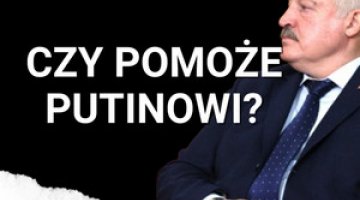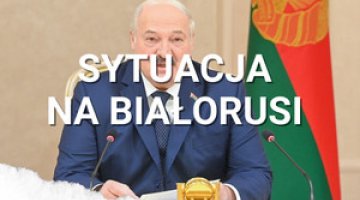Belarus: Harsh sentences on participants in December opposition demonstrations
By passing harsh sentences on opposition activists, President Alyaksandr Lukashenka has demonstrated his strength to the public and the nomenklatura, while at the same time sending a signal that the EU’s sanctions will not encourage Minsk to move away from its policy of repression. Meanwhile Belarus’s dependence on Russian support is deepening, and so the Belarusian government is currently avoiding any confrontation with Russia
In recent weeks, several people from the group of 42 charged under Article 293 of the Criminal Code, on organising and participating in mass unrest, have been handed down jail sentences. The judgements have been harsh, ranging from 3 to 4 years in penal colonies. The court’s only leniency was shown by the imposition of financial penalties against two Russian nationals. In this way, the Belarusian regime has demonstrated that despite growing criticism from the West and the concomitant announcements of new sanctions, it does not intend to turn away from the ongoing repression against the opposition which it began last 19 December.
It seems that it is now most important for President Lukashenka to demonstrate decisiveness in punishing the opposition for its alleged attempt to organise a revolution. At the same time, it cannot be ruled out that, after the trials have been completed, Minsk will try to use the political prisoners as a bargaining card in the normalisation of relations with the EU. Meanwhile, the milder sentences on two Russian citizens stem from the fear of further conflict with Moscow, whose financial and political support is now of crucial importance for the Belarusian government.
The first judgements on the 19 December demonstrations
After putting down the post-election opposition demonstration in the centre of Minsk last 19 December, the Belarusian Prosecutor's Office has charged 42 people under Article 293 of the Criminal Code, on organising and participating in mass public disturbances. On 17 February, a Minsk court handed down the first sentence; Vasil Parfienkou was sentenced to 4 years’ hard labour in a penal colony. In turn, on 2 March the Court sentenced Alyaksandr Atroshchenkau, Dzmitriy Nowik and Alyaksandr Molchanou to 4, 3½ and 3 years’ hard labour in penal colonies respectively. According to Belarusian human rights activists, the evidence presented, including audiovisual documentation, did not justify such severe sentences. So far, the persons charged have come from second-tier opposition structures, so we may assume that the leaders – including some of the candidates in the presidential election – will be handed even harsher sentences. The maximum penalty provided for in this case is 15 years in prison. But the two Russian nationals accused of actively participating in the demonstration were simply fined by the court on 10 March, and were released after the trial.
The regime’s intentions
The harsh sentences for the Belarusian opposition activists shows that the Belarusian regime intends strongly and consistently to punish the organisers and participants in the alleged attempt to overthrow the authorities in the centre of Minsk last 19 December. This was also indicated in a number of statements Lukashenka has made since February this year, in which he warns the opposition against making any attempts to destabilise the situation in the country, and promises that in the event of an emergency he would not hesitate to send in the armed forces. At the same time, in an extensive interview for the Washington Post published at the beginning of March, the Belarusian leader stated that he does not intend to pardon the imprisoned opposition activists, and will leave the verdicts to the courts of law. Lukashenka has thus signalled – primarily to the nomenklatura and to the public – that any manifestation of opposition will be met by the government’s strong reaction. In this way, by continuing the policy of intimidating the opposition, he has strengthened and consolidated the authoritarian system. The scale of the repression has been demonstrated by a report from Ales Michalevich, one of the imprisoned candidates who ran against Lukashenko; after a conditional release pending his hearing, he revealed that he had been subjected to torture, and was forced to sign a pledge to cooperate with the KGB. It can thus be expected that after subsequent convictions, a group of several dozen political prisoners will be created in Belarus over the next few months.
Reactions from the West and Russia
The succession of prison sentences and the reports of imprisoned opposition activists being tortured have met with criticism from the EU. Representatives of some EU states have called for the extension of the visa sanctions against representatives of the Belarusian regime which were adopted on 31 January. The Belarusian government has strongly rejected allegations that the sentences were unduly harsh, and at the beginning of March it invited OSCE observers to monitor the trials on the December riots. Meanwhile, in March the website EUobserver reported on supposed preparations for a new package of sanctions, this time aimed at Belarusian state companies which export petroleum products (among other items) to the West; this report has not been confirmed. The US has adopted a much firmer position; in addition to visa sanctions it has also introduced economic sanctions, relating primarily to the Belarusian petrochemical group Belneftekhim. The issue of the detained opposition activists has also negatively affected Minsk’s relationship with Russia. Moscow has been particularly annoyed by the prosecution of two citizens of the Russian Federation, which was seen as a blow to Russia’s prestige. However, Minsk decided to avoid confrontation.
Conclusions
Currently, it is most important for Alyaksandr Lukashenka to demonstrate the strength of his regime by harshly punishing those people who have been accused of attempting to overthrow it. The Belarusian President has thus continued the actions against political opponents started in December, in order to strengthen and consolidate the authoritarian system of power. The EU’s protests and the sanctions that followed them have not brought about any relaxation of the policy of repression against the opposition. In turn, economic sanctions appear unlikely, since they would infringe the interests of certain EU states. Meanwhile the more lenient sentence for the two Russians shows that the Belarusian authorities have decided not to build upon the story reported earlier in the national media that Russian agents were involved in organising the post-election riots in Minsk. Dependence on the still preferential supply of Russian raw materials, as well as access to the ready market and the need to obtain financial and political support, all mean that Lukashenka has decided not to enter into conflict with the Kremlin. Thanks to this decision, during a meeting of the Council of Ministers of the Belarus/Russia Union State on on March 15, an agreement of some importance for Minsk was signed on cooperation in constructing a Belarusian nuclear power plant. Nevertheless, it cannot be ruled out that a crisis in Russian-Belarusian relations will arise before the end of this year, notably in the sale of strategic assets in Belarusian industry, an issue which has been troublesome to both sides. At that point, Lukashenka may try to exploit the problem of his political prisoners to try and normalise relations with the EU, by linking their release to winning support from Brussels.





